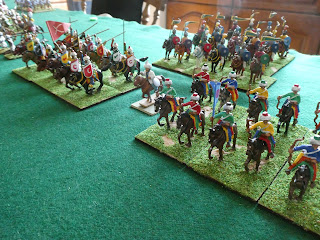 |
| The Muscovites manning the defences |
Outnumbered, the Muscovite commander has decided to concentrate his forces in a village, although one unit of border dragoons is holding a camp where the majority of the supply horses are held, there being no room in the village.
Informed by his scouts that the village ahead was held against him, the Ottoman commander deployed his force with the infantry on the right facing the isolated border dragoons the artillery in the centre and the cavalry on the left.
 |
| The Ottoman cavalry prepare to advance |
On the commander's signal the skirmishers moved forward, followed by the levy and then the janissaries. The levy unit on the extreme right seemed to have been inspired by a preacher's speech as they surged forward chanting. In no time they had left behind the other levy units and even the skirmishers, as they homed in on the border dragoons.
 |
| The levy advance with speed. |
For his part, the Muscovite commander had hoped his cavalry would move over to support the border dragoons, but the Cossacks were reluctant to advance and the chance was lost. The border dragoons had been firing at the approaching Ottomans but although they had inflicted casualties, it was not enough to slow the enemy advance. They would need to depend on their defences to hold up the attack. In this they were sorely disappointed. The original plan was for two levy units to attack, but the precipitate advance of the right hand unit meant they attacked unsupported. Even the skirmishers were unable to help, they had been struck by a volley from the streltsy and had to fall back to rally.
 |
| The Muscovite light artillery prepares to fire at the Ottoman cavalry |
Undaunted, the levy closed up to the chevaux de frise, ignored the volley from the defenders and fired a volley of their own. Although behind cover, the dragoons took heavy casualties and control evaporated. The survivors took to their heels, abandoning their defences and running towards the village. As they emerged from their defences and entered the open area near the village the dragoons offered a tempting target for the Ottoman light cavalry. It was one they did not decline. Galloping through the flanking fire from the village, they hacked and stabbed their way through the unfortunate Muscovites, eliminating them as a fighting force.
 |
| The border dragoons rout |
 |
| and are cut down |
 |
| One unit of ottoman light cavalry routs |
Meanwhile the Ottoman infantry were beginning to bring pressure to bear on the village defences. Still with their artillery lagging behind, the levy approached the village. The unit on the left struggled against an accurate defensive fire from the streltsy, the central unit was fortunate that the cavalry conflict shielded it from fire. The irresponsible advance of the feudal cavalry left them open to a charge by the remaining unit of Ottoman light cavalry. This charge was met at the halt by the feudal cavalry, who absorbed the initial shock, but were unable to drive off their assailants. Seeing an opportunity, the Ottoman cavalry commander ordered the sipahi to reinforce the melee. As the mass of cavalrymen fought, they obscured the advance of the Ottoman infantry.
 |
| A general overview before the Ottoman assault |
Eventually numbers prevailed and the feudal cavalry were overwhelmed, routing. The Ottoman light cavalry were shaken and unable to advance, but the siipahi were in good order and, passing through the light cavalry, followed up their victory. A dire consequence of the cavalry melee was that the streltsy unit which saw the feudal cavalry defeated became disordered. This reduced their ability to withstand the assault by the Ottoman levy infantry. The gun crew who had provided sterling service suffered heavy casualties and the remainder fled. With their defences crumbling, the streltsy also wavered and a final push by the Ottomans had them falling back.
To the left of the levy the janissaries had also charged against the village. After a fierce struggle they too forced their way over the defences, routing the streltsy facing them.
 |
| The defences breached |
With the defences breached, his best units driven back and only a servant Cossack unit remaining to him, the Muscovite commander ordered a general retreat. Fortunately for him, the Ottoman troops were more concerned with looting the provisions stored in the village than pursuing the beaten Muscovite troops.
An interesting first outing for the Ottomans. We experimented with allowing a levy unit which rolled low enough to obtain three actions to go 'fanatic'. The rules state that this advantage lasts until the unit goes shaken. It seemed odd that it persisted even when the unit didn't move; so we decided that in future the fanatic status would only last for the move in which 3 actions were obtained.


A most interesting game that went from bad to worse for the Muscovites. An interesting period with colourful armies, particularly the Ottomans (who suit a wide range of periods, don't they?).
ReplyDeleteYes James, the initial reluctance of the Muscovite cavalry to move cost them dear later on. Among of the attractive aspects of the Ottomans are the range of armies that they can be ranged against and the period of time over which they can be used. I plan to make most of this latter point by basing up archers to replace the arquebus/musket elements to be used alongside the levy.
DeleteDavid
Yes, I am with you there 100%. I am (slooooowly) beginning to do some Ottomans myself which I plan to use for Great Turkish War/Great Northern War through to Napoleonics! (With but a few additions for the latter).
Delete